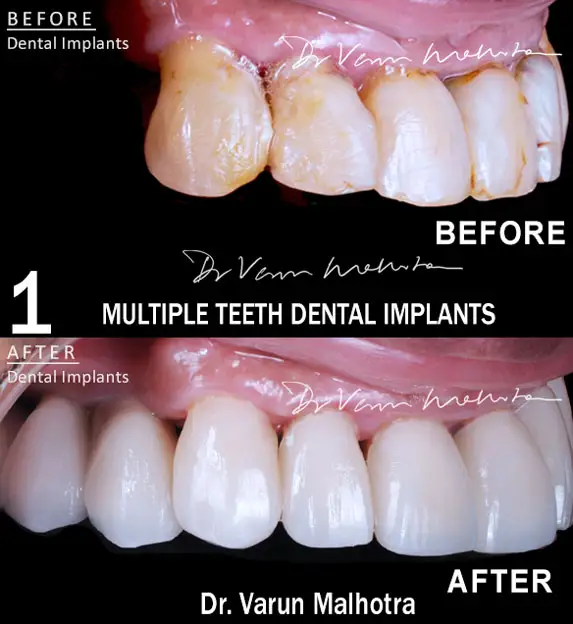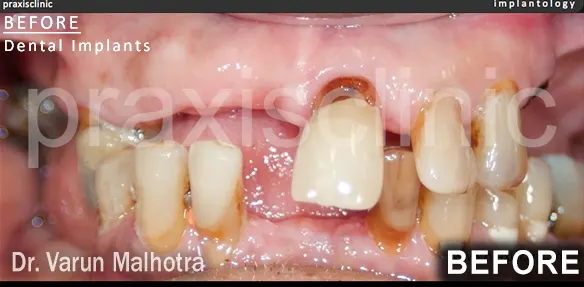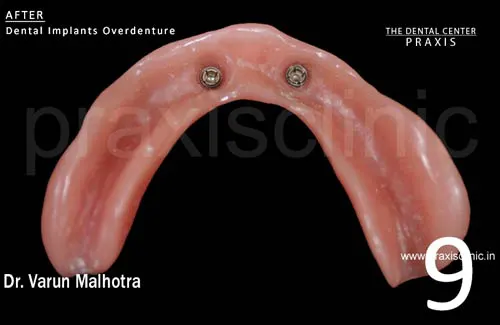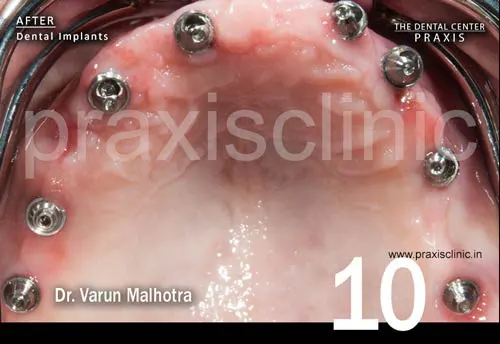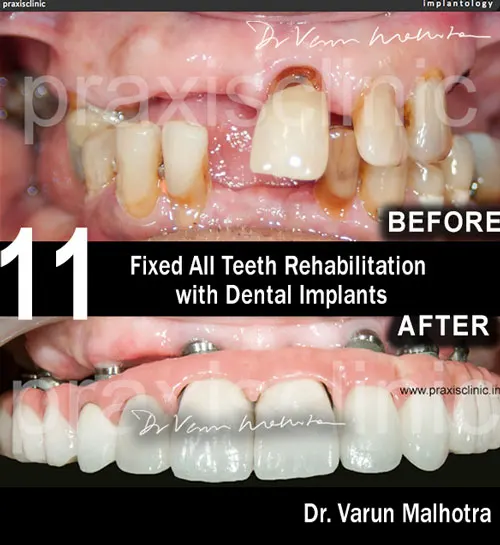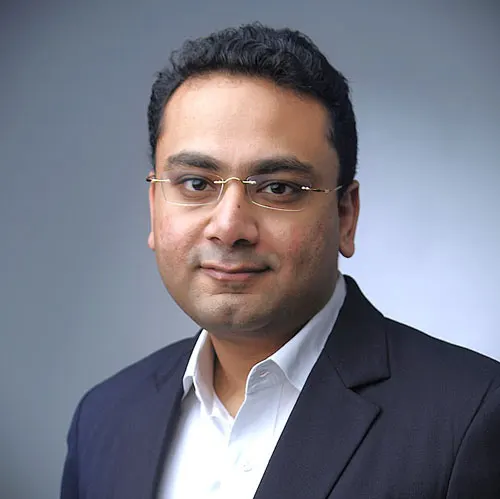Why you should consider a Dental Implant for replacing your missing teeth ?
Click on any of the following options to know more.
1. Impact of Missing Teeth on Aesthetics and Function.
2. What is a Dental Implant ?
3. Step-by-step process of getting a Dental Implant.
4. Benefits of Dental Implants over other options like Dentures or Bridges.
5. Multiple options to replace missing teeth : Single tooth, Multiple teeth, and Full Jaw restorations
6. The Surgical Skill and Experience in implantology of our Dental Implant Surgeon Dr. Varun Malhotra, at The Dental Center - PRAXIS , Mumbai India.
1. The Impact of Missing Teeth on Aesthetics and Function.
Missing teeth can have a significant and multiple impacts on both your oral health and overall well-being.
The effects go far beyond a simple gap in your smile and influence everything from your appearance and confidence to your ability to speak and eat properly.
Aesthetic Impact of Missing Teeth :
The most immediate and visible consequence of missing teeth is the change in your smile's appearance.
A single missing tooth can create an unsightly gap, while multiple missing teeth can dramatically change the look of your entire face.
This can lead to a loss of self-confidence and a reluctance to smile, laugh, or speak in social and professional settings.
Beyond the immediate gap, a missing tooth can also cause the surrounding teeth to shift and drift out of alignment.
This can create new gaps, overcrowding, and other orthodontic issues that further compromise the aesthetics of your smile.
Over time, the loss of tooth support can also cause the facial muscles to sag and the jawbone to shrink, leading to a sunken-in or aged appearance.
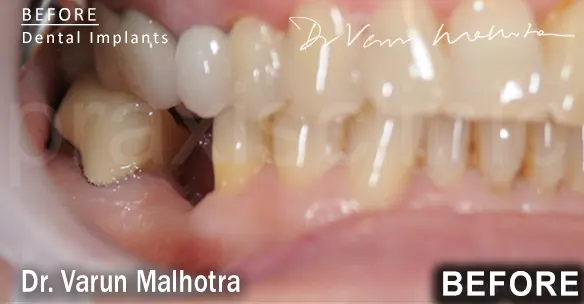
Image of a missing molar tooth in the lower jaw. The Single Missing Tooth is planned to be replaced with one Dental Implant after consultation and treatment planning with Dr. Varun Malhotra ( Dental Implant Surgeon ) at PRAXIS, The Dental Center, Mumbai, India.
View the image of the Replaced Tooth with Dental Implant by clicking here.
Functional Impact of Missing Teeth :
The functional consequences of missing teeth are equally serious.
Each tooth plays a vital role in the complex system of your mouth, and its absence can disrupt this delicate balance.
Difficulty with Chewing and Eating:
Your teeth are designed to work together to chew and grind food efficiently. When a tooth is missing, the remaining teeth have to take on extra stress and workload, which can lead to tooth wear, fractures, and pain.
This can make it difficult to eat certain foods, limiting your dietary choices and potentially affecting your nutrition.
Speech Difficulties:
The tongue and teeth work together to form sounds. A missing tooth, especially at the front of the mouth, can affect your ability to
pronounce certain words, leading to a lisp or other speech impediments.
Jawbone Deterioration:
One of the most critical functional impacts is the loss of jawbone density.
When a tooth is present, its root stimulates the jawbone during chewing, keeping the bone healthy and strong.
When a tooth is missing, this stimulation ceases, and the jawbone begins to resorb or shrink.
This bone loss can compromise the stability of neighboring teeth and limit future treatment options, such as dental implants.
Shifting of Remaining Teeth:
As mentioned above, the teeth on either side of a missing tooth can begin to shift and tilt into the empty space.
The tooth in the opposing jaw may also grow or "super-erupt" into the gap.
This can throw off your bite alignment (occlusion), leading to problems like temporomandibular joint (TMJ) disorders, headaches, and facial pain.
Addressing a missing tooth is crucial for both your appearance and your oral health.
Modern dental solutions like dental implants and bridges offer excellent ways to restore both the aesthetics and function of your smile,
preventing these long-term complications.
2. What is a Dental Implant ?
Dental implants are a popular and effective long-term solution for replacing missing teeth.
They are essentially artificial tooth roots that are surgically placed into your jawbone to provide a stable foundation for a dental
prosthesis, such as a crown, bridge, or denture.
Components of a Dental Implant
A dental implant typically consists of three main parts:
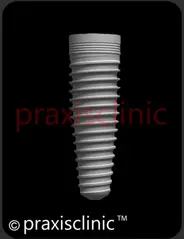
Image of a dental implant fixture. :
This is the part of the implant that is placed surgically in the jaw bone of the patient.
This fixture anchors to the bone and functions like a natural tooth root when used to replace the missing tooth.
The Implant (Fixture): This is a small, screw-like post, usually made of biocompatible materials like titanium or zirconia, that is surgically placed into the jawbone. It acts as the anchor and functions like a natural tooth root.
The Abutment: This is a small connector post that screws into the implant. It extends slightly above the gum line and serves as the foundation for the new artificial tooth.
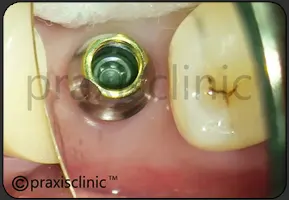
Image of a Dental Implant Abutment. :
Connector that is placed on top of the implant and is above the gum line
The new artificial tooth is installed on this implant abutment.
The Prosthesis (Restoration): This is the visible part of the tooth replacement, which can be a single crown, a dental bridge, or a full set of dentures. It is custom-made to match the color and shape of your natural teeth.
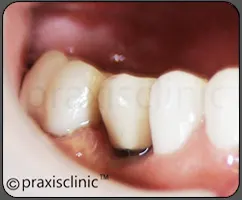
Image of a Single Crown / Cap on a Dental Implant :
The new artificial tooth ( Cap / Crown ) is installed on the top of a dental implant that was surgically installed in the jaw bone of the patient, to replace the missing molar tooth .
3. Step-by-step process of getting a Dental Implant.
The process of getting a dental implant is a multi-stage procedurethat can take several months.
It involves:
Initial Consultation and Planning: Your dentist Dr Varun Malhotra will perform an examination, take X-rays or order a CBCT scan to assess your jawbone,
and create a personalized treatment plan for you.
Implant Placement: The surgeon will make an incision in your gum to expose the jawbone and then drill a hole to place the implant post.
Integration of the Implants with Bone: This is the most crucial part of the process. Over a period of several months, the jawbone naturally grows and fuses with the surface of the implant, a process called osseointegration. This creates a strong and stable base for the new tooth.
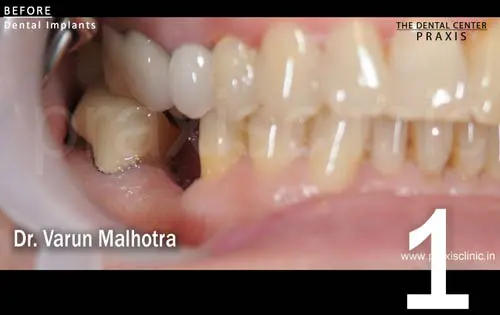
Image of a missing molar tooth in the lower jaw. The Single Missing Tooth is planned to be replaced with one Dental Implant after consultation and treatment planning with Dr. Varun Malhotra ( Dental Implant Surgeon ) at PRAXIS, The Dental Center, Mumbai, India.
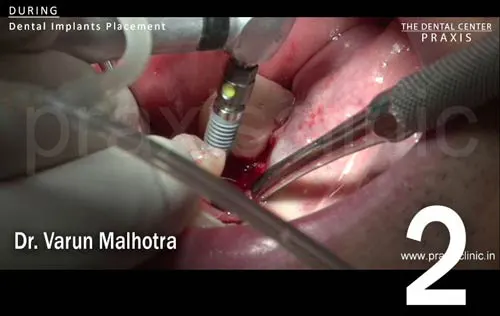
Image of a dental implant being surgically placed at the location of the missing molar tooth in the lower jaw. This single dental implants will replace the
missing molar tooth after it has integrated with the jaw bone of the patient.
Dental Implant surgery performed by Dr. Varun Malhotra ( Oral Implantologist ) at PRAXIS, The Dental Center, Mumbai, India.
Abutment Placement: Once the implant has fully integrated with the bone, a minor procedure is performed to attach the abutment to the implant.
Crown or Prosthesis Placement: After the gums have healed, impressions of your mouth are taken to create your custom-made crown, bridge, or denture. The final restoration is then securely attached to the abutment.
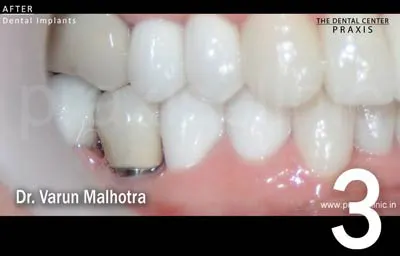
Image of an artificial cap / crown that has been installed on top of the dental implant that was shown being placed in the previous image at the site of the missing molar tooth.
The implant with the artificial cap / crown has now successfully replaced the missing molar tooth.
Dental Implant procedure performed by Dr. Varun Malhotra ( Oral Implantologist ) at PRAXIS, The Dental Center, Mumbai, India.
4. Benefits of Dental Implants over other options like Dentures or Bridges.
Dental implants offer several advantages over other tooth replacement options, such as dentures or bridges:
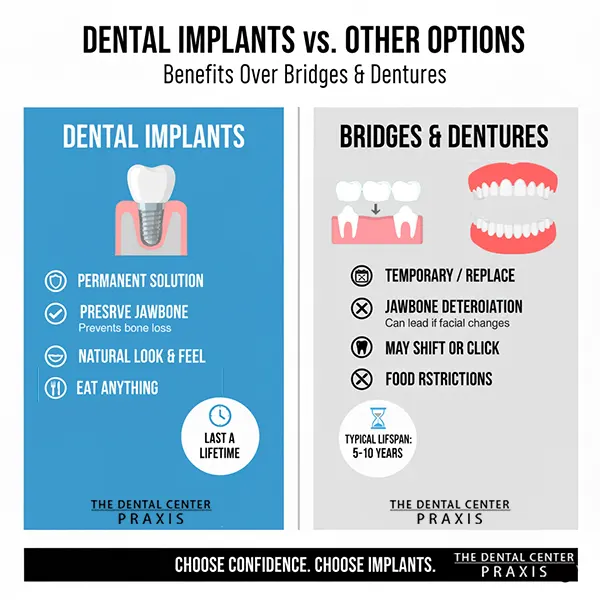
Infographic showing a short summary of benefits of getting dental implants for replacing missing teeth versus getting other options like removable dentures or dental bridges.
Infographic by PRAXIS, The Dental Center, Mumbai, India one of the leading clinics for Dental Implants.
Improved Appearance and Confidence: They look and feel like natural teeth, restoring your smile.
Enhanced Chewing Function: They provide a strong and stable foundation, allowing you to eat your favorite foods with ease.
Jawbone Preservation: When a tooth is lost, the jawbone in that area can deteriorate. Implants stimulate the bone, preventing this bone loss.
Durability and Longevity: With proper care, dental implants can last a lifetime, making them a cost-effective long-term solution.
No Impact / Damage on Adjacent Teeth: Unlike a traditional bridge, which requires altering adjacent healthy teeth, an implant stands on its own.
5. Multiple options to replace missing teeth : Single tooth, Multiple teeth, and Full Jaw restorations.
At The Dental Center, Praxis, we offer multiple options to replace missing teeth .
These options include :
Single Tooth replacement with Dental Implant:
In this option a single implant is inserted in the jaw bone in the location where the missing tooth was earlier.
After the Dental Implant integrates with the jawbone , a single cap or crown is placed on top of the implant to replace the missing tooth .

Image of a missing molar tooth in the lower jaw. The Single Missing Tooth is planned to be replaced with one Dental Implant after consultation and treatment planning with Dr. Varun Malhotra ( Dental Implant Surgeon ) at PRAXIS, The Dental Center, Mumbai, India.

Image of a dental implant being surgically placed at the location of the missing molar tooth in the lower jaw. This single dental implants will replace the
missing molar tooth after it has integrated with the jaw bone of the patient.
Dental Implant surgery performed by Dr. Varun Malhotra ( Oral Implantologist ) at PRAXIS, The Dental Center, Mumbai, India.
The Cap or Crown prosthetic that replaces the tooth can be made of different material options , that can be selected by you in
consultation with the dental surgeon at the time of planning of the dental implant based treatment .

Image of a Single Artificial Cap / Crown that has been installed on top of the dental implant that was shown being placed in the previous image at the site ofthe missing molar tooth.
The implant with the artificial cap / crown has now successfully replaced the missing molar tooth.
Dental Implant procedure performed by Dr. Varun Malhotra ( Oral Implantologist ) at PRAXIS, The Dental Center, Mumbai, India.
Multiple Teeth replacement with Dental Implants.
In this option , two or more adjacent teeth can be replaced with 2 or more dental implants . The dental implants can be used as single supports or
as a bridge to support the multiple missing teeth.
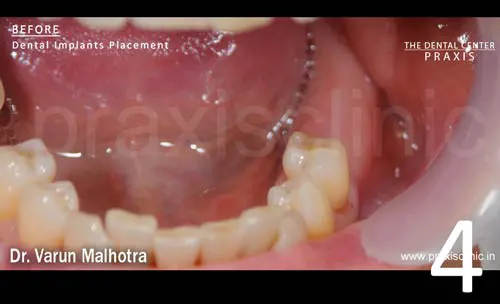
Image of a Multiple (Two) missing molar teeth in the lower jaw.
The 2 Missing Teeth are planned to be replaced with 2 Dental Implants , one for each of the molars after consultation and treatment planning with Dr. Varun Malhotra ( Dental Implant Surgeon )
at PRAXIS, The Dental Center, Mumbai, India.
The benefits of this method to replace multiple adjacent missing teeth are :
1. The natural teeth don't need to be touched for making a dental bridge to support the missing teeth.
2. The prosthetic / replaced teeth are fixed onto the dental implants . This makes the implant supported teeth a better option than the removable partial dentures.
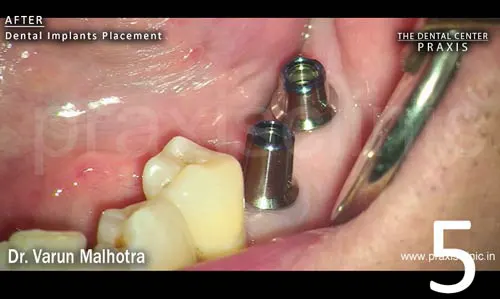
Image of two dental implant abutments on top of two dental implants that have been placed at the site of the two missing molar teeth.
Dental Implant procedure performed by Dr. Varun Malhotra ( Oral Implantologist ) at PRAXIS, The Dental Center, Mumbai, India.
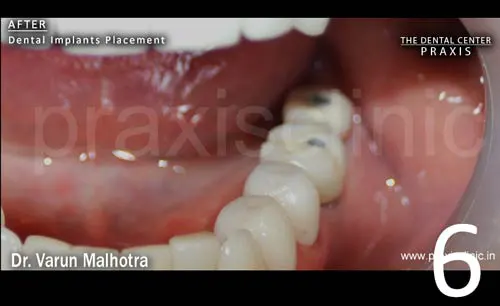
Two individual dental caps / crowns have been installed on top of each of the dental implants. This completes the replacement of the two missing
molar teeth successfully with the aid of dental implants.
This method offers the best technique to replace missing teeth with a fixed and log lasting
prosthetic cap / crown.
Dental Implant procedure performed by Dr. Varun Malhotra ( Dental Implant Specialist ) at PRAXIS, The Dental Center, Mumbai, India.
3. Since the missing teeth are supported by dental implants which are integrated directly to the jaw bone , the dental implant supported prosthesis is suitable
for chewing hard foods with ease . This however is not easily possible with the removable options for teeth replacement .
Dental Implants to support Dentures.
Some people have their entire teeth replaced with full dentures that are removable .
However there are certain disadvantages to removable dentures, like :
1. Over a period of time, these removable dentures become loose due to changes in the jaw bone .
To resolve this issue of dentures become lose / poorly fitting , the dentures either need to re-fabricated or their fitting surface needs to be readjusted with a procedure called as relining to regain their
proper fit .
2. Inability or Difficulty to chew hard foods with removable dentures .
3. Constant need to remove and clean the dentures .
4. Loose dentures may pose an issue falling out during mid conversation which cab be an embarrassing situation in a social setting .
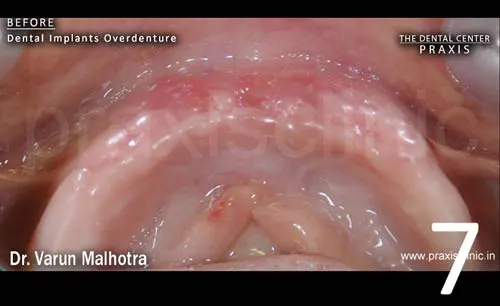
Image of lower jaw of a patient who had been wearing dentures since many years, but their dentures had become loose. The patient didnt want to change
their dentures but at the same time wanted a long term solution to improving the fit of the same .
A Treatment plan of installing two dental implants and to use the existing denture as overdenture was approved by the patient,
after a detailed consultation with Dr. Varun Malhotra ( Oral Implantologist ) at PRAXIS, The Dental Center, Mumbai, India.
There can be situations in which a patient's dentures have become lose , but they don't want to change these dentures ,because they are used to wearing
these dentures since a long time.
In situations like these , Dental Implants can be used resolve the issue of loose fit of these existing dentures .
A few dental implants ranging from a minimum of 2 to a maximum of 4 can be surgically placed in the jaw bone.
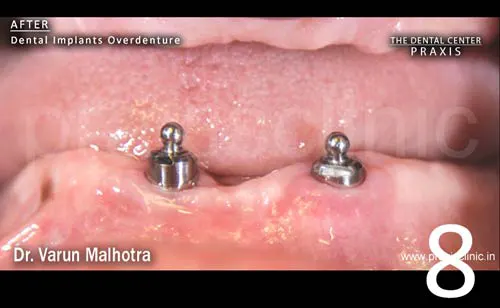
To improve the fit of the denture , two dental implants have been installed surgically in the lower jaw of the patient. Specialised
attachments have been placed on the top of these dental implants which will anchor the existing denture. These attachments are visible in this image.
This anchorage of the denture to these dental implants, improves the fit of the patient's denture by a great extent.
The existing denture is now called a Dental Implant Supported Overdenture.
Dental Implant Surgery by Dr. Varun Malhotra ( Dental Implant Specialist ) at PRAXIS, The Dental Center, Mumbai, India.
